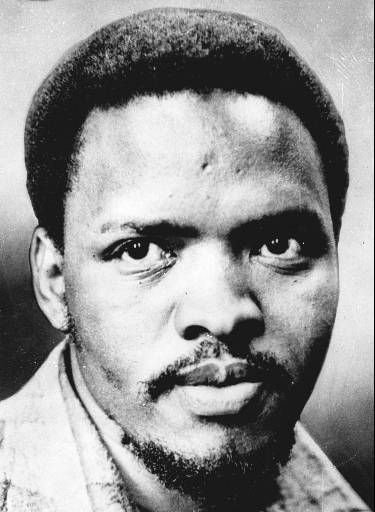Hero #021: Steven Biko … (05/13/16)
Born in 1946, Biko was an anti-apartheid activist in South Africa in the 1960’s & 1970’s. Early on he became a popular student leader and founded the Black Consciousness Movement, which empowered and mobilized much of the urban black population. He was famous for his slogan “Black is beautiful”, which he described as meaning: “You are okay as you are. Begin to look upon yourself as a human being.”
Later, Biko became a key figure in The Durban Moment, and he was banned by the apartheid government in February of 1973, meaning that he was not allowed to speak to more than one person at a time nor to speak in public, that he was restricted to the King William’s Town magisterial district, and that he could not write publicly or speak with the media. It was also forbidden to quote anything he said, including speeches or even simple conversations. In spite of this repression, Biko played a significant role in organizing the protests which culminated in the Soweto Uprising of June 16, 1976. In the aftermath of that protest, which was met with heavy-handed violence by security forces, government authorities began to target Biko further.
On August 18 of 1977, Biko was arrested at a police roadblock under the Terrorism Act No 83 of 1967 and cruelly interrogated for twenty-two hours — repeatedly tortured & beaten until he suffered a major head injury and fell into a coma. Several weeks later (on September 11, 1977), police loaded him into the back of a Land Rover, naked and restrained in manacles, and drove him roughly 700 miles to a prison in Pretoria with hospital facilities. At that time, he was nearly dead due his previous mistreatments, and he did indeed die shortly after arriving in Pretoria the next day. Unsurprisingly, the police claimed Biko’s death was the result of an extended hunger strike, and yet a subsequent autopsy clearly revealed that he ultimately succumbed to a brain hemorrhage from the massive head injuries he had sustained during his incarceration and its multiple “interrogations”.
Because of his high profile, news of Biko’s death spread quickly, publicizing the repressive nature of the apartheid government, and greatly assisting the movement that eventually succeeded in bringing down that repressive government. His funeral was attended by over 10,000 people, including numerous ambassadors and other diplomats from the United States and Western Europe.
“The greatest weapon in the hand of the oppressor is the mind of the oppressed … It is better to die for an idea that will live, than to live for an idea that will die.” ~ Steven Biko





 ;
;